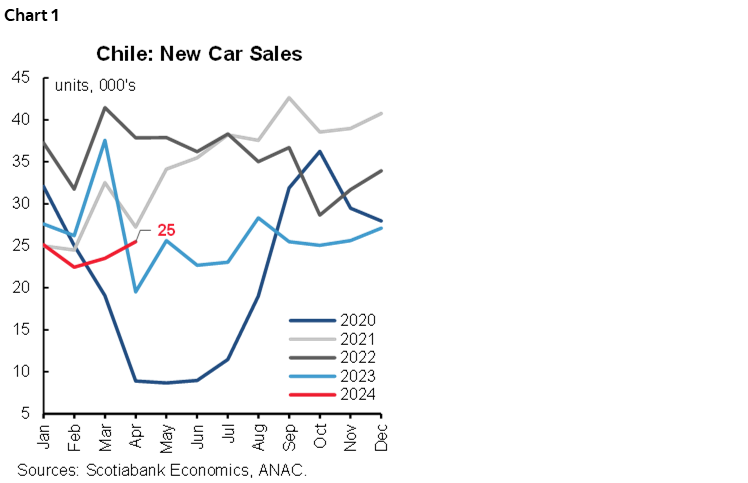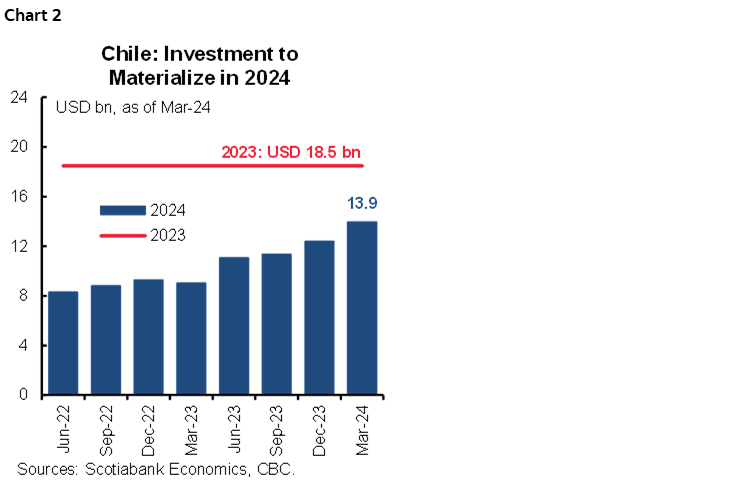- Chile: We project A GDP expansion between 4 and 5% y/y in April
Preliminary data guide that private consumption would remain stable in the second quarter. According to figures from the Central Bank (BCCh), private consumption expanded 1.1% q/q in Q1-24, mainly thanks to the expansion in non-durable goods consumption (1.9% q/q), as spending on durable goods fell (-1.4% q/q). For a first look into what consumption growth could be in Q2-24, the statistical agency (INE) will publish Retail Sales for April this Friday, May 31st, for which we project an expansion of 1.0% y/y owing to growth in new car sales in contrast to zero growth in retail sales ex-autos. While new car sales have recently rebounded, they remain at historically low levels (chart 1).

Investment stabilized in Q1-24 thanks to public investment. According to the National Accounts figures from the BCCh, total investment (seasonally adjusted) remained practically stable in the first quarter, both in its machinery and equipment component and in its construction component. Key to this performance would have been the expansion of public investment in the first quarter, which grew 28% y/y (adjusted for inflation), the highest in the last ten years for a first quarter. Looking ahead, with information as of March disclosed by the Capital Goods Corporation (CBC), their projections for investment in 2024 rose by 12.6% (+USD 1.5bn) compared to their estimates three months prior, mainly thanks to the largest investment push made in the energy sector (start of a new project), followed by mining due to greater investments in operational continuity, and public works thanks to the investment in Metro Line 9. Despite this, investment in 2024 is still expected to total less than last year (chart 2). This is why we maintain our projection of zero expansion in total investment for 2024.

All in all, we anticipate a GDP expansion between 4 and 5% y/y in April owing to the positive contribution of the three additional working days compared to the previous year, which would have mainly benefited industry and mining. The above is compatible with our GDP growth projection of 3% for this year.
—Aníbal Alarcón
DISCLAIMER
This report has been prepared by Scotiabank Economics as a resource for the clients of Scotiabank. Opinions, estimates and projections contained herein are our own as of the date hereof and are subject to change without notice. The information and opinions contained herein have been compiled or arrived at from sources believed reliable but no representation or warranty, express or implied, is made as to their accuracy or completeness. Neither Scotiabank nor any of its officers, directors, partners, employees or affiliates accepts any liability whatsoever for any direct or consequential loss arising from any use of this report or its contents.
These reports are provided to you for informational purposes only. This report is not, and is not constructed as, an offer to sell or solicitation of any offer to buy any financial instrument, nor shall this report be construed as an opinion as to whether you should enter into any swap or trading strategy involving a swap or any other transaction. The information contained in this report is not intended to be, and does not constitute, a recommendation of a swap or trading strategy involving a swap within the meaning of U.S. Commodity Futures Trading Commission Regulation 23.434 and Appendix A thereto. This material is not intended to be individually tailored to your needs or characteristics and should not be viewed as a “call to action” or suggestion that you enter into a swap or trading strategy involving a swap or any other transaction. Scotiabank may engage in transactions in a manner inconsistent with the views discussed this report and may have positions, or be in the process of acquiring or disposing of positions, referred to in this report.
Scotiabank, its affiliates and any of their respective officers, directors and employees may from time to time take positions in currencies, act as managers, co-managers or underwriters of a public offering or act as principals or agents, deal in, own or act as market makers or advisors, brokers or commercial and/or investment bankers in relation to securities or related derivatives. As a result of these actions, Scotiabank may receive remuneration. All Scotiabank products and services are subject to the terms of applicable agreements and local regulations. Officers, directors and employees of Scotiabank and its affiliates may serve as directors of corporations.
Any securities discussed in this report may not be suitable for all investors. Scotiabank recommends that investors independently evaluate any issuer and security discussed in this report, and consult with any advisors they deem necessary prior to making any investment.
This report and all information, opinions and conclusions contained in it are protected by copyright. This information may not be reproduced without the prior express written consent of Scotiabank.
™ Trademark of The Bank of Nova Scotia. Used under license, where applicable.
Scotiabank, together with “Global Banking and Markets”, is a marketing name for the global corporate and investment banking and capital markets businesses of The Bank of Nova Scotia and certain of its affiliates in the countries where they operate, including; Scotiabank Europe plc; Scotiabank (Ireland) Designated Activity Company; Scotiabank Inverlat S.A., Institución de Banca Múltiple, Grupo Financiero Scotiabank Inverlat, Scotia Inverlat Casa de Bolsa, S.A. de C.V., Grupo Financiero Scotiabank Inverlat, Scotia Inverlat Derivados S.A. de C.V. – all members of the Scotiabank group and authorized users of the Scotiabank mark. The Bank of Nova Scotia is incorporated in Canada with limited liability and is authorised and regulated by the Office of the Superintendent of Financial Institutions Canada. The Bank of Nova Scotia is authorized by the UK Prudential Regulation Authority and is subject to regulation by the UK Financial Conduct Authority and limited regulation by the UK Prudential Regulation Authority. Details about the extent of The Bank of Nova Scotia's regulation by the UK Prudential Regulation Authority are available from us on request. Scotiabank Europe plc is authorized by the UK Prudential Regulation Authority and regulated by the UK Financial Conduct Authority and the UK Prudential Regulation Authority.
Scotiabank Inverlat, S.A., Scotia Inverlat Casa de Bolsa, S.A. de C.V, Grupo Financiero Scotiabank Inverlat, and Scotia Inverlat Derivados, S.A. de C.V., are each authorized and regulated by the Mexican financial authorities.
Not all products and services are offered in all jurisdictions. Services described are available in jurisdictions where permitted by law.

